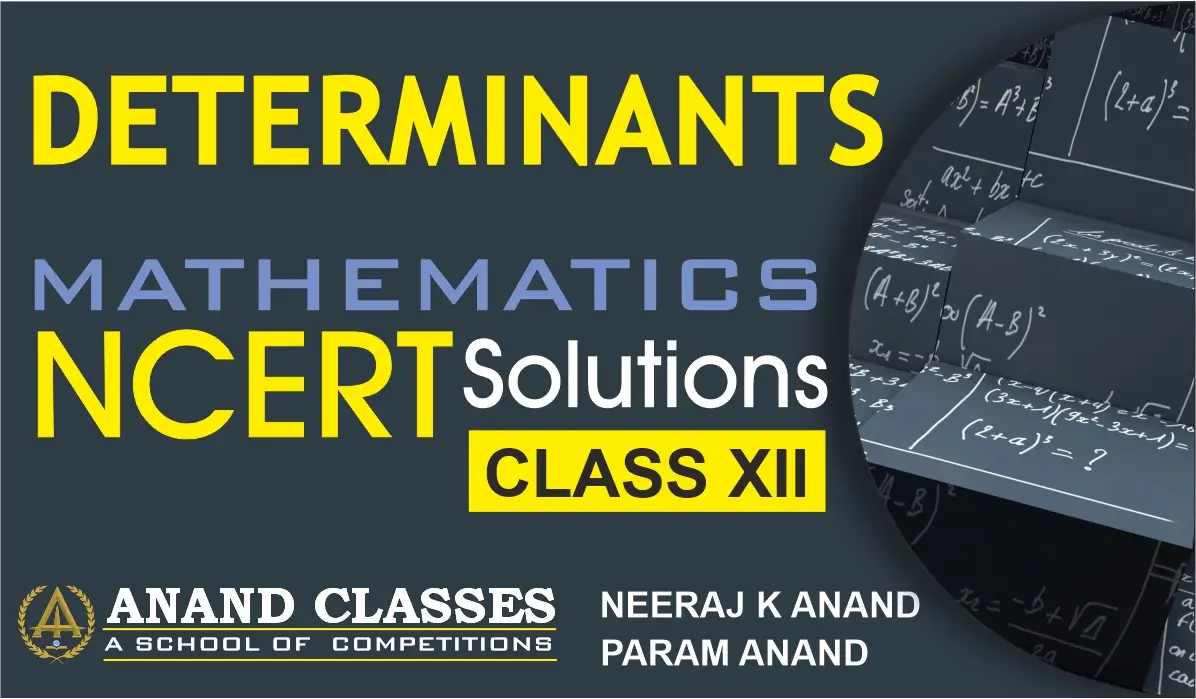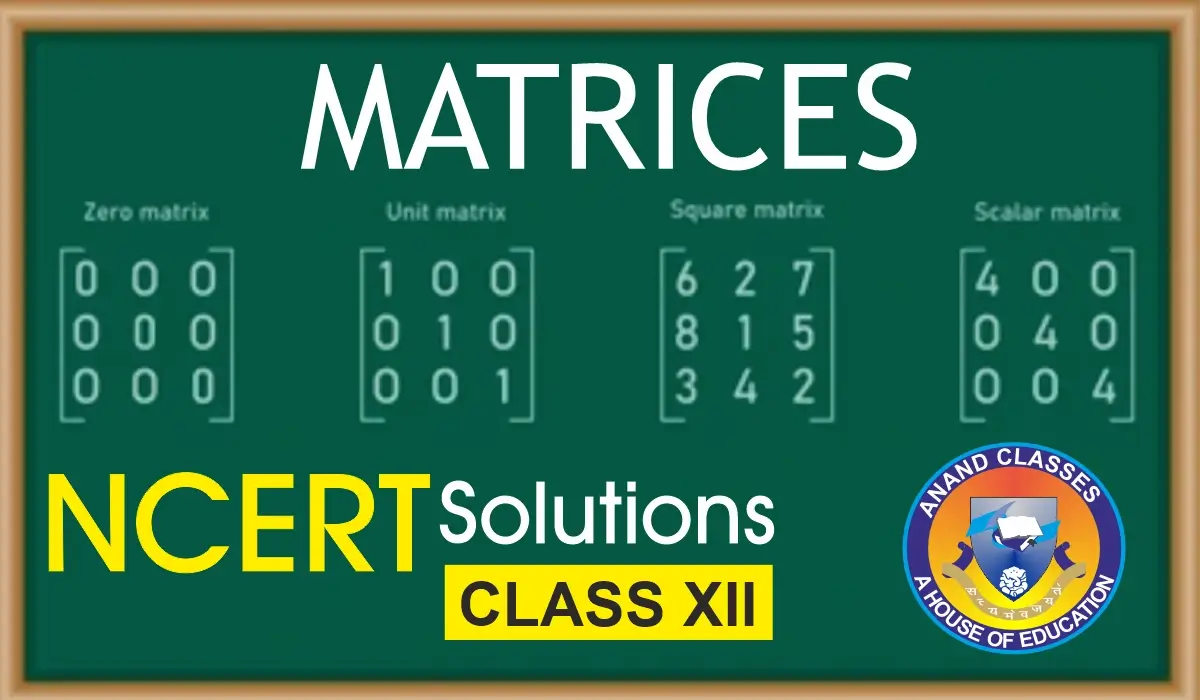Anand Classes presents a free downloadable PDF of NCERT Solutions for Class 12 Maths Chapter 9 – Differential Equations, Exercise 9.5 (Set-2), specially prepared to help students master the topic of homogeneous and linear differential equations with detailed, step-by-step explanations aligned to the latest CBSE syllabus. Click the print button to download study material and notes.
NCERT Question.10 : Find the general solution of differential equation
$$(x+y)\frac{dy}{dx}=1$$
Solution :
Given differential equation is
$$(x+y)\frac{dy}{dx}=1$$
Rewrite as
$$\frac{dy}{dx}=\frac{1}{x+y}$$
Put $u=x+y$ so that $\dfrac{du}{dx}=1+\dfrac{dy}{dx}$ and since $\dfrac{dy}{dx}=\dfrac{1}{u}$ we get
$$\frac{du}{dx}=1+\frac{1}{u}=\frac{u+1}{u}$$
Separate and integrate
$$\frac{u}{u+1}du=dx$$
Write the integrand as $1-\dfrac{1}{u+1}$ and integrate
$$\int\left(1-\frac{1}{u+1}\right)du=\int dx$$
$$u-\ln|u+1|=x+C$$
Substitute $u=x+y$ and simplify (the $x$ terms cancel) to obtain the implicit general solution
$$y-\ln|x+y+1|=C$$
Hence the general solution is
$$\boxed{y-\ln|x+y+1|=C}$$
or $$\boxed{x + y + 1 = ce^y}$$
which is the required general solution.
Download clear worked solutions and concise notes from Anand Classes for quick revision and stronger problem solving for JEE and CBSE preparation.
NCERT Question.11 : Find the general solution of differential equation
$$ydx+(x-y^{2})dy=0$$
Solution :
Given differential equation
$$ydx+(x-y^{2})dy=0$$
Divide by $dy$ and rearrange
$$y\frac{dx}{dy}+x-y^{2}=0$$
$$\frac{dx}{dy}+\frac{1}{y}x=y$$
This is linear in $x$ with $P=\dfrac{1}{y}$ and $Q=y$
Integrating factor
$$\mu(y)=e^{\int \frac{1}{y}dy}=e^{\ln y}=y$$
Hence Solution is :
$$xy=\int y \times y \;dy=\frac{y^{3}}{3}+C$$
Hence
$$\boxed{x=\frac{y^{2}}{3}+\frac{C}{y}}$$
Download clear worked solutions and concise notes from Anand Classes for focused practice and fast improvement in differential equations.
NCERT Question.12 : Find the general solution of differential equation
$$(x+3y^{2})\frac{dy}{dx}=y\qquad (y>0)$$
Solution :
Given general solution of differential equation
$$(x+3y^{2})\frac{dy}{dx}=y\qquad (y>0)$$
Rewrite the equation in differential form
$$ydx=(x+3y^{2})dy$$
Divide by $dy$ and arrange as a linear equation for $x$ as a function of $y$
$$\frac{dx}{dy}= \frac{x+3y^{2}}{y}$$
$$\frac{dx}{dy}-\frac{1}{y}x=3y$$
This is linear in $x$ with $P=-\dfrac{1}{y}$ and $Q=3y$
Integrating factor
$$\mu(y)=e^{\int Pdy}=e^{\int -\frac{1}{y}dy}=e^{-\ln y}=y^{-1}$$
$$x \times y^{-1} = \int 3y \times y^{-1} dy +C $$
$$\frac{x}{y}=3y+C$$
Thus
$$x=3y^{2}+Cy$$
Hence the general solution is
$$\boxed{x=3y^{2}+Cy}$$
Download concise solved notes and practice problems from Anand Classes for clear stepwise methods and focused revision ideal for JEE and CBSE preparation.
NCERT Question.13 : Find the particular solution of differential equation
$$\frac{dy}{dx}+2y\tan x=\sin x\qquad y=0\text{ when }x=\frac{\pi}{3}$$
Solution :
Given differential equation
$$\frac{dy}{dx}+2y\tan x=\sin x $$
Compare with $\dfrac{dy}{dx}+Py=Q$ so $P=2\tan x$ and $Q=\sin x$
Integrating factor
$$\mu(x)=e^{\int 2\tan xdx}=e^{2\ln\sec x}=\sec^{2}x$$
Multiply through by $\mu$ and integrate
$$y\sec^{2}x=\int \sec^{2}x\sin xdx + C$$
Note $\sec^{2}x\sin x=\dfrac{\sin x}{\cos^{2}x}=\dfrac{d}{dx}(\sec x)$ so
$$\int \sec^{2}x\sin xdx=\sec x$$
Thus
$$y\sec^{2}x=\sec x + C$$
Multiply by $\cos^{2}x$
$$y=\cos x + C\cos^{2}x$$
Use initial condition $y=0$ at $x=\frac{\pi}{3}$ so
$$0=\cos\frac{\pi}{3}+C\cos^{2}\frac{\pi}{3}$$
$$0=\tfrac{1}{2}+C\cdot\tfrac{1}{4}$$
$$C=-2$$
Therefore the particular solution is
$$\boxed{y=\cos x-2\cos^{2}x}$$
Download notes by Anand Classes perfect for JEE and CBSE preparation.
NCERT Question.14 : Find the particular solution of differential equation
$$(1+x^{2})\frac{dy}{dx}+2xy=\frac{1}{1+x^{2}}\qquad y(1)=0$$
Solution:
Given differential equation
$$(1+x^{2})\frac{dy}{dx}+2xy=\frac{1}{1+x^{2}} $$
Divide by $1+x^{2}$ to make the coefficient of $\dfrac{dy}{dx}$ unity
$$\frac{dy}{dx}+\frac{2x}{1+x^{2}}y=\frac{1}{(1+x^{2})^{2}}$$
Compare with $\dfrac{dy}{dx}+Py=Q$ so
$$P=\frac{2x}{1+x^{2}}, \qquad Q=\frac{1}{(1+x^{2})^{2}}$$
Integrating factor
$$\mu(x)=e^{\int Pdx}=e^{\int \dfrac{2x}{1+x^{2}}dx}=e^{\ln(1+x^{2})}=1+x^{2}$$
Multiply through by $\mu$ and integrate
$$y(1+x^{2})=\int (1+x^{2})\frac{1}{(1+x^{2})^{2}}dx + C
=\int \frac{1}{1+x^{2}}dx + C$$
$$y(1+x^{2})=\tan^{-1}x + C$$
Use the condition $y(1)=0$
$$0\cdot(1+1)=\tan^{-1}1 + C\implies 0=\frac{\pi}{4}+C\implies C=-\frac{\pi}{4}$$
Thus the particular solution is
$$\boxed{y=\frac{\tan^{-1}x-\dfrac{\pi}{4}}{1+x^{2}}}$$
Download clear worked solutions and concise notes from Anand Classes for focused practice and fast revision for JEE and CBSE preparation.
NCERT Question.15 : Find a particular solution satisfying the condition
$$\frac{dy}{dx}-3y\cot x=\sin 2x\qquad y=2\text{ when }x=\frac{\pi}{2}$$
Solution:
Given differential equation
$$\frac{dy}{dx}-3y\cot x=\sin 2x$$
Compare with $ \dfrac{dy}{dx}+Py=Q$ so $P=-3\cot x$ and $Q=\sin 2x$
Integrating factor
$$\mu(x)=e^{\int Pdx}=e^{\int -3\cot xdx}=e^{-3\ln\sin x}=(\sin x)^{-3}$$
Multiply through by $\mu$ and integrate
$$y(\sin x)^{-3}=\int (\sin x)^{-3}\sin 2xdx + C$$
Simplify the integrand using $\sin 2x=2\sin x\cos x$
$$(\sin x)^{-3}\sin 2x=2\frac{\cos x}{\sin^{2}x}$$
Let $u=\sin x$ so $du=\cos xdx$ and the integral becomes
$$\int 2\frac{\cos x}{\sin^{2}x}dx=2\int \frac{du}{u^{2}}=-\frac{2}{u}+{\rm constant}=-2\csc x+{\rm constant}$$
Thus
$$y(\sin x)^{-3}=-2\csc x + C$$
Multiply through by $\sin^{3}x$
$$y=-2\sin^{2}x + C\sin^{3}x$$
Use the condition $y=2$ at $x=\frac{\pi}{2}$ where $\sin\frac{\pi}{2}=1 $
$$2=-2(1)^{2}+C(1)^{3}$$
Solve for $C$
$$C=4$$
Hence the required particular solution is
$$\boxed{y=-2\sin^{2}x+4\sin^{3}x}$$
Download concise solved differential equation notes from Anand Classes for clear stepwise methods and exam oriented practice.
NCERT Question.16 : Find the equation of the curve passing through the origin given that the slope of the tangent at any point $(x,y)$ is equal to the sum of the coordinates of that point
Solution :
Slope of the tangent to the curve at any point $(x, y)$ = Sum of coordinates of the point $(x, y)$.
Slope condition
$$\frac{dy}{dx}=x+y$$
Bring to linear form
$$\frac{dy}{dx}-y=x$$
Compare with $\dfrac{dy}{dx}+Py=Q$ so $P=-1$ and $Q=x$
Integrating factor
$$\mu(x)=e^{\int Pdx}=e^{\int -1dx}=e^{-x}$$
Multiply through by $\mu$ and integrate
$$y e^{-x}=\int x e^{-x}dx + C$$
Compute the integral by parts with $u=x$ and $dv=e^{-x}dx$ so $du=dx$ and $v=-e^{-x}$
$$\int x e^{-x}dx=-x e^{-x}-e^{-x}+C$$
Thus
$$y e^{-x}=-x e^{-x}-e^{-x}+C$$
Multiply by $e^{x}$
$$y=-x-1+Ce^{x}$$
Use the condition that the curve passes through the origin $(0,0)$
$$0=-0-1+C\implies C=1$$
Therefore the equation of the required curve is
$$\boxed{y=-x-1+e^{x}}$$
Download clear worked solutions and concise notes from Anand Classes perfect for JEE and CBSE preparation.
NCERT Question.17 : Find the equation of the curve passing through the point $(0,2)$ given that the sum of the coordinates of any point on the curve exceeds the magnitude of the slope of the tangent to the curve at that point by $5$
Solution : According to question,
Sum of the coordinates of any point say $(x, y)$ on the curve = Magnitude of the slope of the tangent to the curve + 5.
$$x+y=\frac{dy}{dx}+5$$
so
$$\frac{dy}{dx}-y=x-5$$
This is linear with $P=-1$ and $Q=x-5$
Integrating factor
$$\mu(x)=e^{\int Pdx}=e^{-x}$$
Multiply through by $\mu$ and integrate
$$y e^{-x}=\int (x-5)e^{-x}dx + C$$
Compute the integral:
$$\int (x-5)e^{-x}dx=\int x e^{-x}dx-5\int e^{-x}dx\\
=-x e^{-x}-e^{-x}+5e^{-x}=-x e^{-x}+4e^{-x}$$
Thus
$$y e^{-x}=-x e^{-x}+4e^{-x}+C$$
Multiply by $e^{x}$
$$y=-x+4+Ce^{x}$$
Use the condition $(0,2)$ so $2=-0+4+C$ giving $C=-2$
Hence the required curve is
$$\boxed{y=4-x-2e^{x}}$$
Download concise worked solutions and practice sheets from Anand Classes perfect for JEE and CBSE revision and quick concept mastery.
NCERT Question.18 : Choose the correct answer:
The integrating factor of the differential equation
$$x\frac{dy}{dx} – y = 2x^2$$
is
(A) $e^{-x}$ (B) $e^{-y}$ (C) $\dfrac{1}{x}$ (D) $x$
Solution :
Given:
$$x\frac{dy}{dx} – y = 2x^2$$
Dividing every term by $x$ to make the coefficient of $\dfrac{dy}{dx}$ unity,
$$\frac{dy}{dx} – \frac{y}{x} = 2x$$
This is a linear differential equation of the form
$$\frac{dy}{dx} + Py = Q$$
Here,
$$P = -\frac{1}{x}, \quad Q = 2x$$
Now,
$$\int Pdx = \int -\frac{1}{x}dx = -\log x = \log x^{-1}$$
Therefore,
$$\text{Integrating Factor (I.F.)} = e^{\int Pdx} = e^{\log x^{-1}} = x^{-1} = \dfrac{1}{x}$$
Hence, the correct option is (C).
Get expertly formatted step-by-step differential equation notes from Anand Classes, ideal for CBSE and JEE preparation with clear solutions for easy understanding.
NCERT Question.19 : Choose the correct answer:
The integrating factor of the differential equation
$$(1 – y^2) \frac{dx}{dy} + xy = ay, \quad -1 < y < 1$$
(A) $\frac{1+y}{1-y}$ (B) $\frac{1-y}{1+y}$ (C) $\sqrt{\frac{1+y}{1-y}}$ (D) $(1 – y^2)^{-1/2}$
Solution :
The given differential equation is
$$(1 – y^2) \frac{dx}{dy} + xy = ay, \quad -1 < y < 1$$
Dividing every term by $(1 – y^2)$ to make the coefficient of $\dfrac{dx}{dy}$ unity, we get
$$\frac{dx}{dy} + \frac{y}{1 – y^2} x = \frac{a y}{1 – y^2}$$
This is a linear differential equation of the form
$$\frac{dx}{dy} + P x = Q$$
where $P = \dfrac{y}{1 – y^2}$ and $Q = \dfrac{ay}{1 – y^2}$.
The integrating factor (I.F.) is
$$\mu(y) = e^\left(\int P dy\right) = e^\left(\int \frac{y}{1 – y^2}dy\right)$$
Compute the integral:
$$\int \frac{y}{1 – y^2} dy = -\frac{1}{2} \log(1 – y^2)$$
Hence,
$$\mu(y) = e^{- \frac{1}{2} \log(1 – y^2)} = (1 – y^2)^{-1/2}$$
So the correct option is (D).
Download top-quality study material by Anand Classes for clear explanations and step-by-step solutions, perfect for JEE and CBSE preparation.


